Entrepreneur Analysis Report
VerifiedAdded on 2023/06/07
|12
|2600
|180
AI Summary
This report analyzes an entrepreneur's interview regarding his experience as an entrepreneur. It describes entrepreneurship from the interviewee's answers and draws general conclusions about entrepreneurs and entrepreneurship as a whole.
Contribute Materials
Your contribution can guide someone’s learning journey. Share your
documents today.
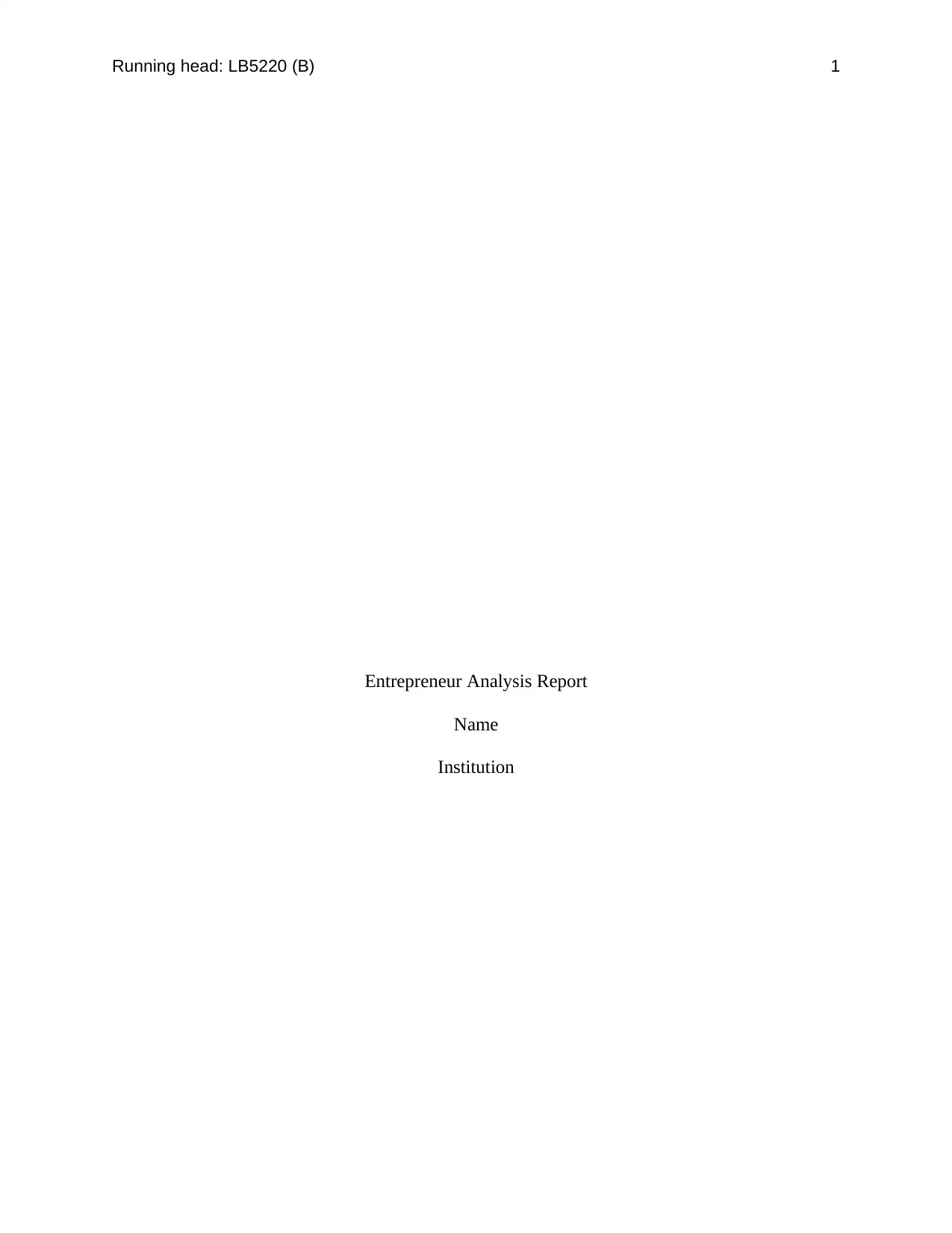
Running head: LB5220 (B) 1
Entrepreneur Analysis Report
Name
Institution
Entrepreneur Analysis Report
Name
Institution
Secure Best Marks with AI Grader
Need help grading? Try our AI Grader for instant feedback on your assignments.
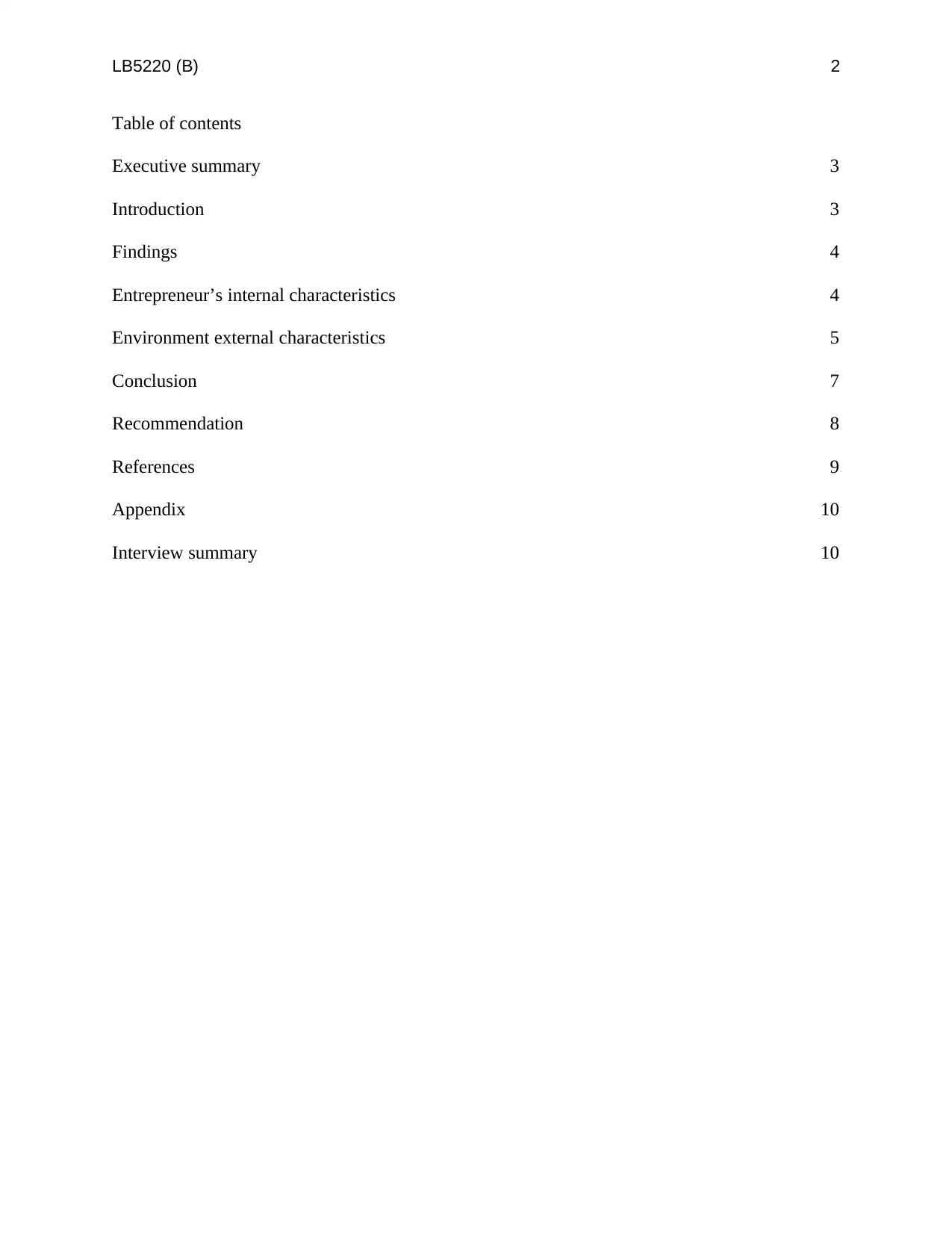
LB5220 (B) 2
Table of contents
Executive summary 3
Introduction 3
Findings 4
Entrepreneur’s internal characteristics 4
Environment external characteristics 5
Conclusion 7
Recommendation 8
References 9
Appendix 10
Interview summary 10
Table of contents
Executive summary 3
Introduction 3
Findings 4
Entrepreneur’s internal characteristics 4
Environment external characteristics 5
Conclusion 7
Recommendation 8
References 9
Appendix 10
Interview summary 10
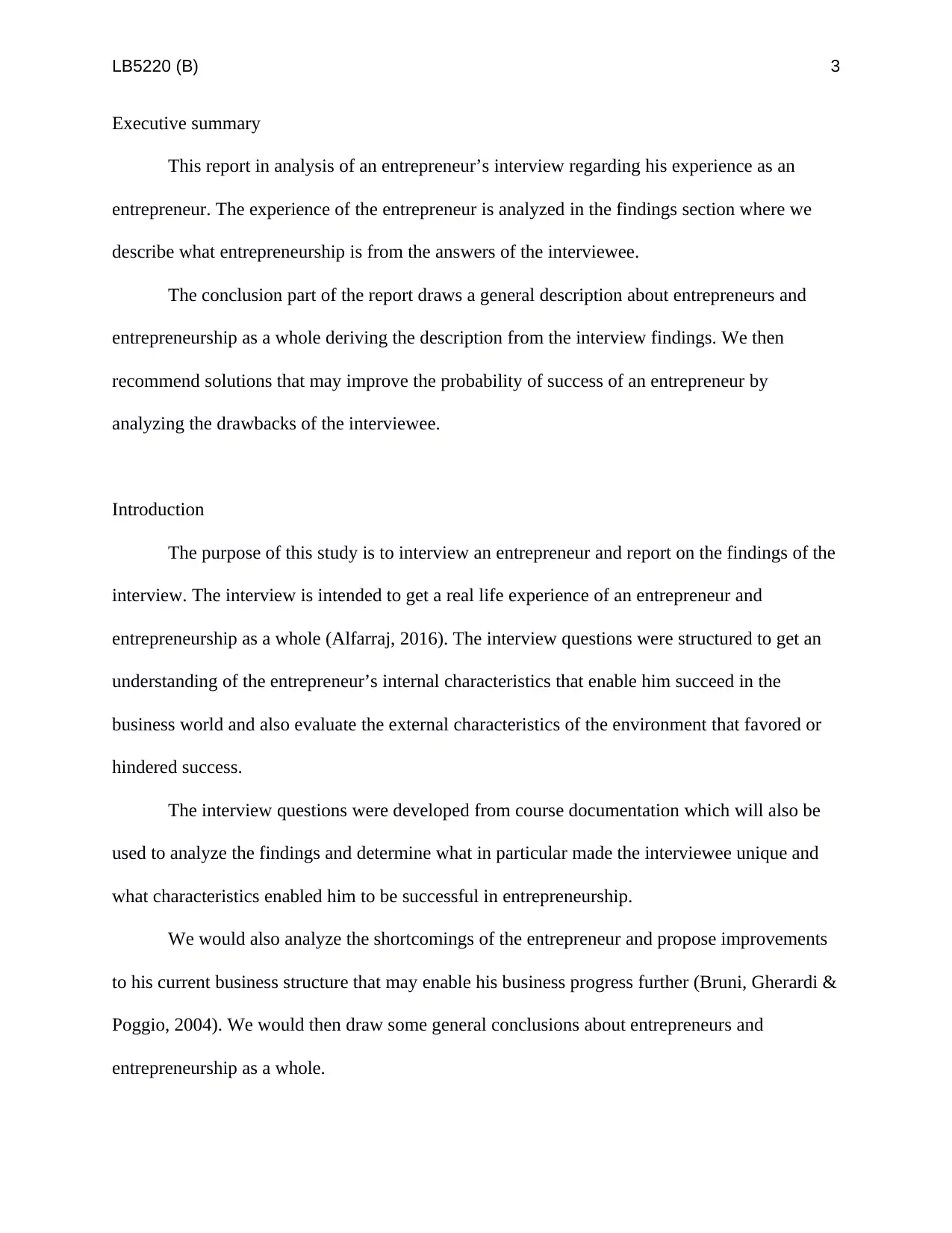
LB5220 (B) 3
Executive summary
This report in analysis of an entrepreneur’s interview regarding his experience as an
entrepreneur. The experience of the entrepreneur is analyzed in the findings section where we
describe what entrepreneurship is from the answers of the interviewee.
The conclusion part of the report draws a general description about entrepreneurs and
entrepreneurship as a whole deriving the description from the interview findings. We then
recommend solutions that may improve the probability of success of an entrepreneur by
analyzing the drawbacks of the interviewee.
Introduction
The purpose of this study is to interview an entrepreneur and report on the findings of the
interview. The interview is intended to get a real life experience of an entrepreneur and
entrepreneurship as a whole (Alfarraj, 2016). The interview questions were structured to get an
understanding of the entrepreneur’s internal characteristics that enable him succeed in the
business world and also evaluate the external characteristics of the environment that favored or
hindered success.
The interview questions were developed from course documentation which will also be
used to analyze the findings and determine what in particular made the interviewee unique and
what characteristics enabled him to be successful in entrepreneurship.
We would also analyze the shortcomings of the entrepreneur and propose improvements
to his current business structure that may enable his business progress further (Bruni, Gherardi &
Poggio, 2004). We would then draw some general conclusions about entrepreneurs and
entrepreneurship as a whole.
Executive summary
This report in analysis of an entrepreneur’s interview regarding his experience as an
entrepreneur. The experience of the entrepreneur is analyzed in the findings section where we
describe what entrepreneurship is from the answers of the interviewee.
The conclusion part of the report draws a general description about entrepreneurs and
entrepreneurship as a whole deriving the description from the interview findings. We then
recommend solutions that may improve the probability of success of an entrepreneur by
analyzing the drawbacks of the interviewee.
Introduction
The purpose of this study is to interview an entrepreneur and report on the findings of the
interview. The interview is intended to get a real life experience of an entrepreneur and
entrepreneurship as a whole (Alfarraj, 2016). The interview questions were structured to get an
understanding of the entrepreneur’s internal characteristics that enable him succeed in the
business world and also evaluate the external characteristics of the environment that favored or
hindered success.
The interview questions were developed from course documentation which will also be
used to analyze the findings and determine what in particular made the interviewee unique and
what characteristics enabled him to be successful in entrepreneurship.
We would also analyze the shortcomings of the entrepreneur and propose improvements
to his current business structure that may enable his business progress further (Bruni, Gherardi &
Poggio, 2004). We would then draw some general conclusions about entrepreneurs and
entrepreneurship as a whole.
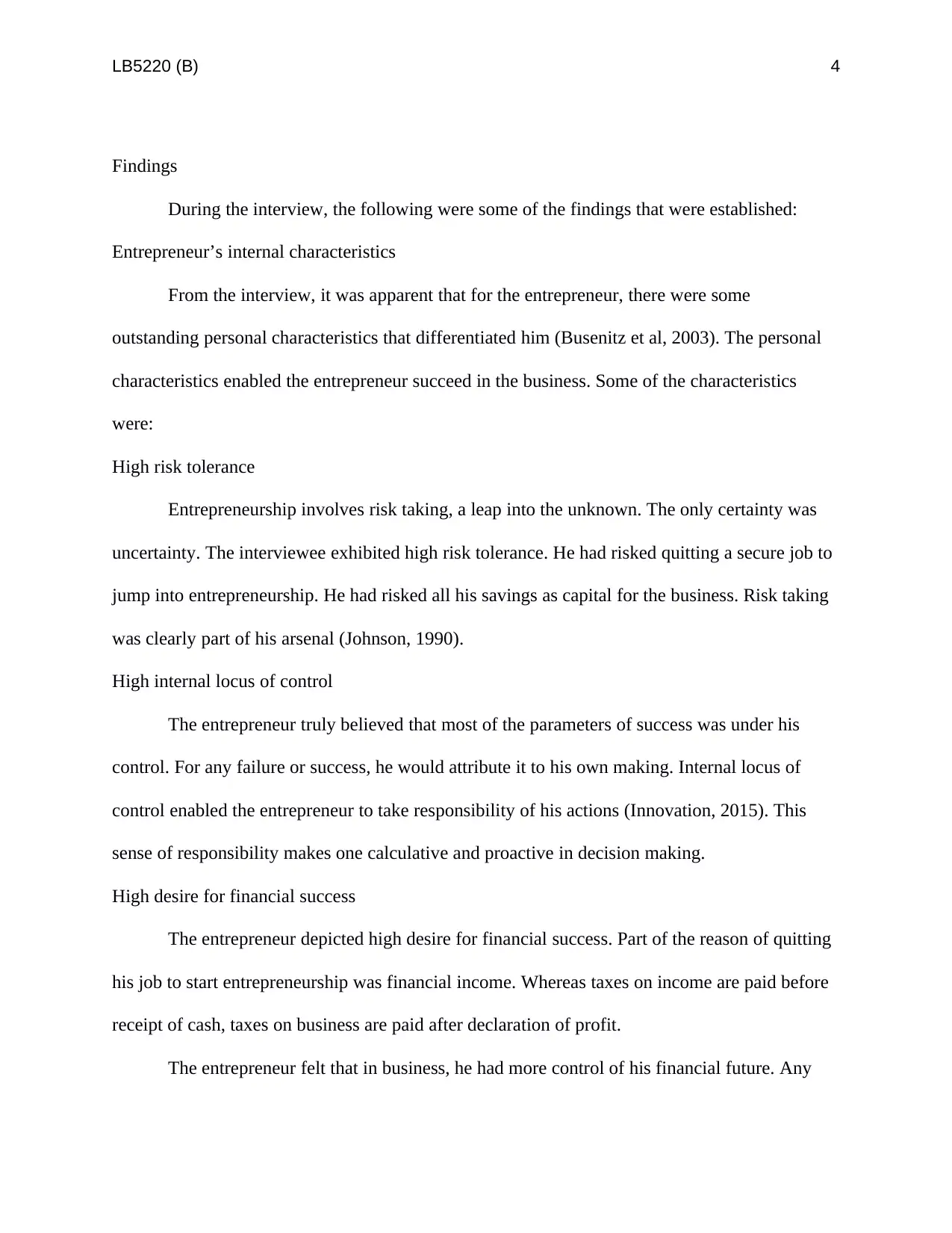
LB5220 (B) 4
Findings
During the interview, the following were some of the findings that were established:
Entrepreneur’s internal characteristics
From the interview, it was apparent that for the entrepreneur, there were some
outstanding personal characteristics that differentiated him (Busenitz et al, 2003). The personal
characteristics enabled the entrepreneur succeed in the business. Some of the characteristics
were:
High risk tolerance
Entrepreneurship involves risk taking, a leap into the unknown. The only certainty was
uncertainty. The interviewee exhibited high risk tolerance. He had risked quitting a secure job to
jump into entrepreneurship. He had risked all his savings as capital for the business. Risk taking
was clearly part of his arsenal (Johnson, 1990).
High internal locus of control
The entrepreneur truly believed that most of the parameters of success was under his
control. For any failure or success, he would attribute it to his own making. Internal locus of
control enabled the entrepreneur to take responsibility of his actions (Innovation, 2015). This
sense of responsibility makes one calculative and proactive in decision making.
High desire for financial success
The entrepreneur depicted high desire for financial success. Part of the reason of quitting
his job to start entrepreneurship was financial income. Whereas taxes on income are paid before
receipt of cash, taxes on business are paid after declaration of profit.
The entrepreneur felt that in business, he had more control of his financial future. Any
Findings
During the interview, the following were some of the findings that were established:
Entrepreneur’s internal characteristics
From the interview, it was apparent that for the entrepreneur, there were some
outstanding personal characteristics that differentiated him (Busenitz et al, 2003). The personal
characteristics enabled the entrepreneur succeed in the business. Some of the characteristics
were:
High risk tolerance
Entrepreneurship involves risk taking, a leap into the unknown. The only certainty was
uncertainty. The interviewee exhibited high risk tolerance. He had risked quitting a secure job to
jump into entrepreneurship. He had risked all his savings as capital for the business. Risk taking
was clearly part of his arsenal (Johnson, 1990).
High internal locus of control
The entrepreneur truly believed that most of the parameters of success was under his
control. For any failure or success, he would attribute it to his own making. Internal locus of
control enabled the entrepreneur to take responsibility of his actions (Innovation, 2015). This
sense of responsibility makes one calculative and proactive in decision making.
High desire for financial success
The entrepreneur depicted high desire for financial success. Part of the reason of quitting
his job to start entrepreneurship was financial income. Whereas taxes on income are paid before
receipt of cash, taxes on business are paid after declaration of profit.
The entrepreneur felt that in business, he had more control of his financial future. Any
Paraphrase This Document
Need a fresh take? Get an instant paraphrase of this document with our AI Paraphraser
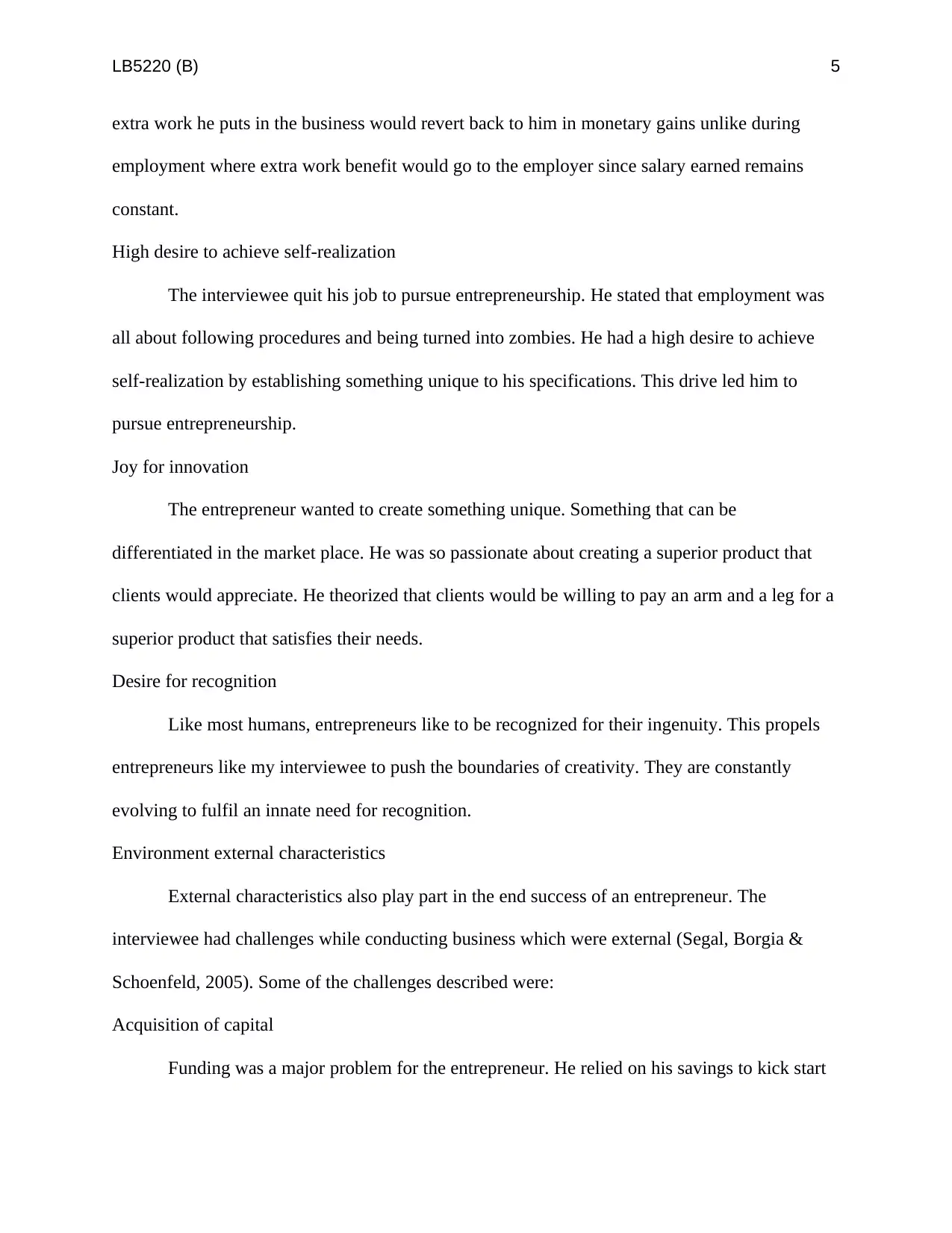
LB5220 (B) 5
extra work he puts in the business would revert back to him in monetary gains unlike during
employment where extra work benefit would go to the employer since salary earned remains
constant.
High desire to achieve self-realization
The interviewee quit his job to pursue entrepreneurship. He stated that employment was
all about following procedures and being turned into zombies. He had a high desire to achieve
self-realization by establishing something unique to his specifications. This drive led him to
pursue entrepreneurship.
Joy for innovation
The entrepreneur wanted to create something unique. Something that can be
differentiated in the market place. He was so passionate about creating a superior product that
clients would appreciate. He theorized that clients would be willing to pay an arm and a leg for a
superior product that satisfies their needs.
Desire for recognition
Like most humans, entrepreneurs like to be recognized for their ingenuity. This propels
entrepreneurs like my interviewee to push the boundaries of creativity. They are constantly
evolving to fulfil an innate need for recognition.
Environment external characteristics
External characteristics also play part in the end success of an entrepreneur. The
interviewee had challenges while conducting business which were external (Segal, Borgia &
Schoenfeld, 2005). Some of the challenges described were:
Acquisition of capital
Funding was a major problem for the entrepreneur. He relied on his savings to kick start
extra work he puts in the business would revert back to him in monetary gains unlike during
employment where extra work benefit would go to the employer since salary earned remains
constant.
High desire to achieve self-realization
The interviewee quit his job to pursue entrepreneurship. He stated that employment was
all about following procedures and being turned into zombies. He had a high desire to achieve
self-realization by establishing something unique to his specifications. This drive led him to
pursue entrepreneurship.
Joy for innovation
The entrepreneur wanted to create something unique. Something that can be
differentiated in the market place. He was so passionate about creating a superior product that
clients would appreciate. He theorized that clients would be willing to pay an arm and a leg for a
superior product that satisfies their needs.
Desire for recognition
Like most humans, entrepreneurs like to be recognized for their ingenuity. This propels
entrepreneurs like my interviewee to push the boundaries of creativity. They are constantly
evolving to fulfil an innate need for recognition.
Environment external characteristics
External characteristics also play part in the end success of an entrepreneur. The
interviewee had challenges while conducting business which were external (Segal, Borgia &
Schoenfeld, 2005). Some of the challenges described were:
Acquisition of capital
Funding was a major problem for the entrepreneur. He relied on his savings to kick start
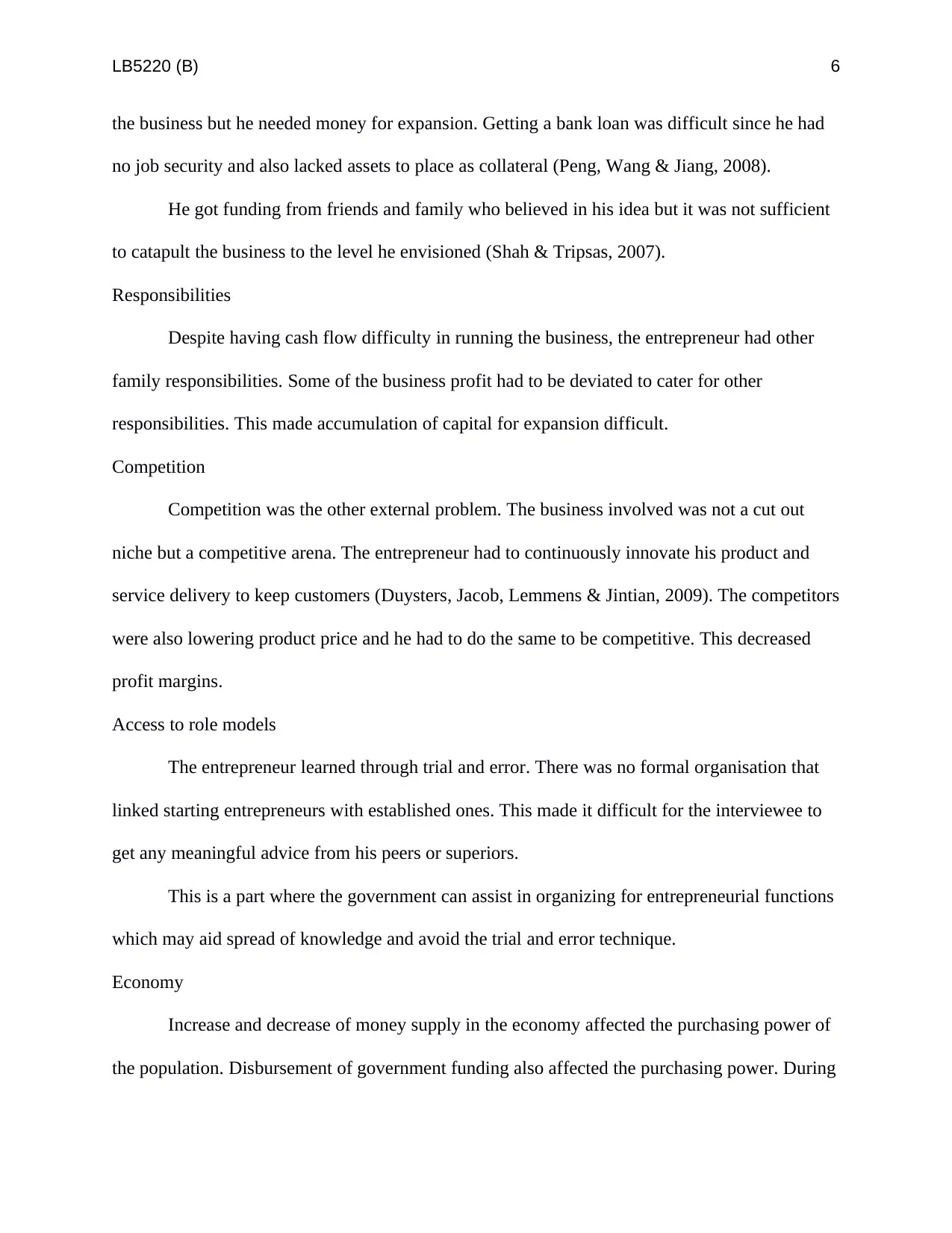
LB5220 (B) 6
the business but he needed money for expansion. Getting a bank loan was difficult since he had
no job security and also lacked assets to place as collateral (Peng, Wang & Jiang, 2008).
He got funding from friends and family who believed in his idea but it was not sufficient
to catapult the business to the level he envisioned (Shah & Tripsas, 2007).
Responsibilities
Despite having cash flow difficulty in running the business, the entrepreneur had other
family responsibilities. Some of the business profit had to be deviated to cater for other
responsibilities. This made accumulation of capital for expansion difficult.
Competition
Competition was the other external problem. The business involved was not a cut out
niche but a competitive arena. The entrepreneur had to continuously innovate his product and
service delivery to keep customers (Duysters, Jacob, Lemmens & Jintian, 2009). The competitors
were also lowering product price and he had to do the same to be competitive. This decreased
profit margins.
Access to role models
The entrepreneur learned through trial and error. There was no formal organisation that
linked starting entrepreneurs with established ones. This made it difficult for the interviewee to
get any meaningful advice from his peers or superiors.
This is a part where the government can assist in organizing for entrepreneurial functions
which may aid spread of knowledge and avoid the trial and error technique.
Economy
Increase and decrease of money supply in the economy affected the purchasing power of
the population. Disbursement of government funding also affected the purchasing power. During
the business but he needed money for expansion. Getting a bank loan was difficult since he had
no job security and also lacked assets to place as collateral (Peng, Wang & Jiang, 2008).
He got funding from friends and family who believed in his idea but it was not sufficient
to catapult the business to the level he envisioned (Shah & Tripsas, 2007).
Responsibilities
Despite having cash flow difficulty in running the business, the entrepreneur had other
family responsibilities. Some of the business profit had to be deviated to cater for other
responsibilities. This made accumulation of capital for expansion difficult.
Competition
Competition was the other external problem. The business involved was not a cut out
niche but a competitive arena. The entrepreneur had to continuously innovate his product and
service delivery to keep customers (Duysters, Jacob, Lemmens & Jintian, 2009). The competitors
were also lowering product price and he had to do the same to be competitive. This decreased
profit margins.
Access to role models
The entrepreneur learned through trial and error. There was no formal organisation that
linked starting entrepreneurs with established ones. This made it difficult for the interviewee to
get any meaningful advice from his peers or superiors.
This is a part where the government can assist in organizing for entrepreneurial functions
which may aid spread of knowledge and avoid the trial and error technique.
Economy
Increase and decrease of money supply in the economy affected the purchasing power of
the population. Disbursement of government funding also affected the purchasing power. During
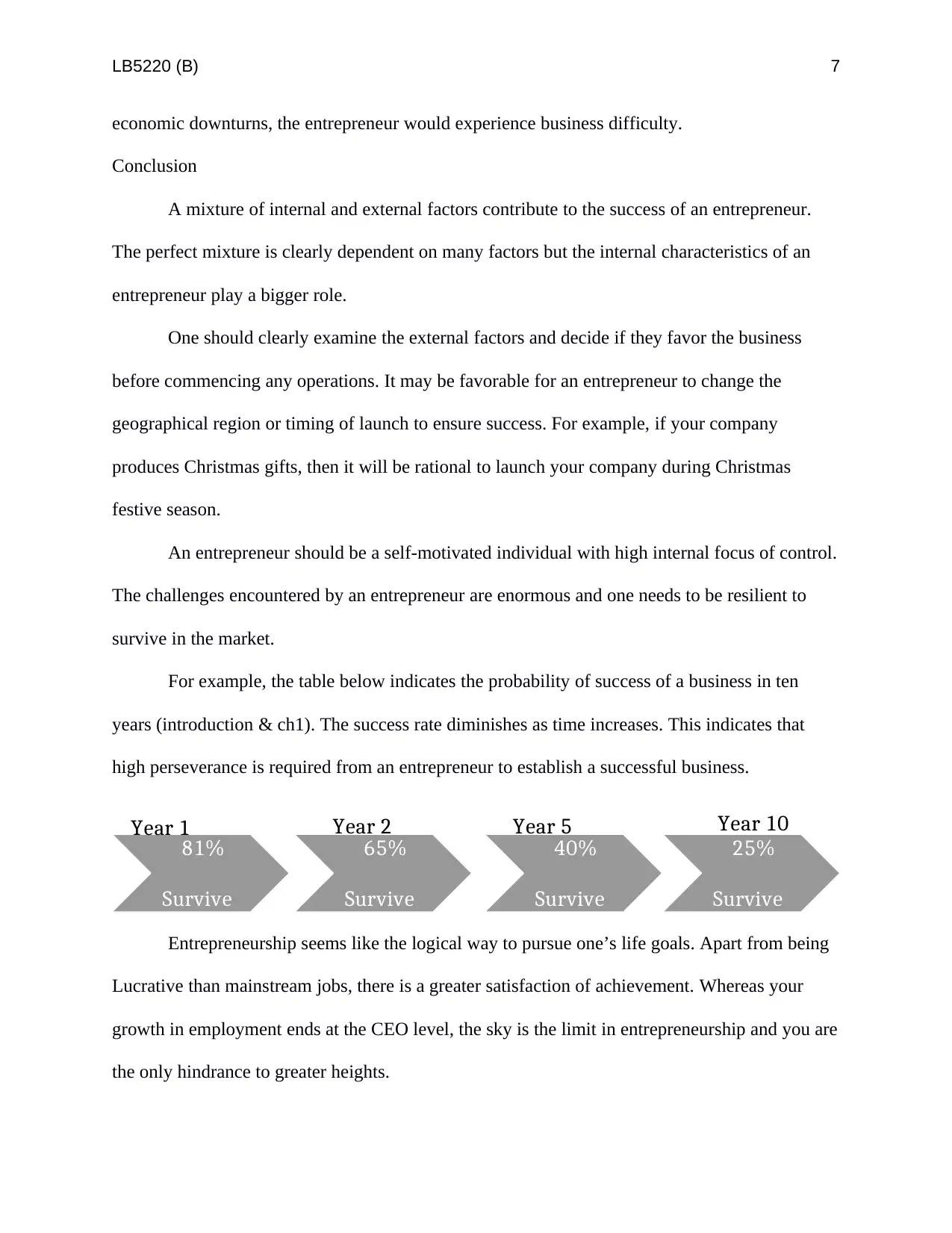
LB5220 (B) 7
economic downturns, the entrepreneur would experience business difficulty.
Conclusion
A mixture of internal and external factors contribute to the success of an entrepreneur.
The perfect mixture is clearly dependent on many factors but the internal characteristics of an
entrepreneur play a bigger role.
One should clearly examine the external factors and decide if they favor the business
before commencing any operations. It may be favorable for an entrepreneur to change the
geographical region or timing of launch to ensure success. For example, if your company
produces Christmas gifts, then it will be rational to launch your company during Christmas
festive season.
An entrepreneur should be a self-motivated individual with high internal focus of control.
The challenges encountered by an entrepreneur are enormous and one needs to be resilient to
survive in the market.
For example, the table below indicates the probability of success of a business in ten
years (introduction & ch1). The success rate diminishes as time increases. This indicates that
high perseverance is required from an entrepreneur to establish a successful business.
Entrepreneurship seems like the logical way to pursue one’s life goals. Apart from being
Lucrative than mainstream jobs, there is a greater satisfaction of achievement. Whereas your
growth in employment ends at the CEO level, the sky is the limit in entrepreneurship and you are
the only hindrance to greater heights.
81%
Survive
65%
Survive
40%
Survive
25%
Survive
Year 1 Year 2 Year 5 Year 10
economic downturns, the entrepreneur would experience business difficulty.
Conclusion
A mixture of internal and external factors contribute to the success of an entrepreneur.
The perfect mixture is clearly dependent on many factors but the internal characteristics of an
entrepreneur play a bigger role.
One should clearly examine the external factors and decide if they favor the business
before commencing any operations. It may be favorable for an entrepreneur to change the
geographical region or timing of launch to ensure success. For example, if your company
produces Christmas gifts, then it will be rational to launch your company during Christmas
festive season.
An entrepreneur should be a self-motivated individual with high internal focus of control.
The challenges encountered by an entrepreneur are enormous and one needs to be resilient to
survive in the market.
For example, the table below indicates the probability of success of a business in ten
years (introduction & ch1). The success rate diminishes as time increases. This indicates that
high perseverance is required from an entrepreneur to establish a successful business.
Entrepreneurship seems like the logical way to pursue one’s life goals. Apart from being
Lucrative than mainstream jobs, there is a greater satisfaction of achievement. Whereas your
growth in employment ends at the CEO level, the sky is the limit in entrepreneurship and you are
the only hindrance to greater heights.
81%
Survive
65%
Survive
40%
Survive
25%
Survive
Year 1 Year 2 Year 5 Year 10
Secure Best Marks with AI Grader
Need help grading? Try our AI Grader for instant feedback on your assignments.
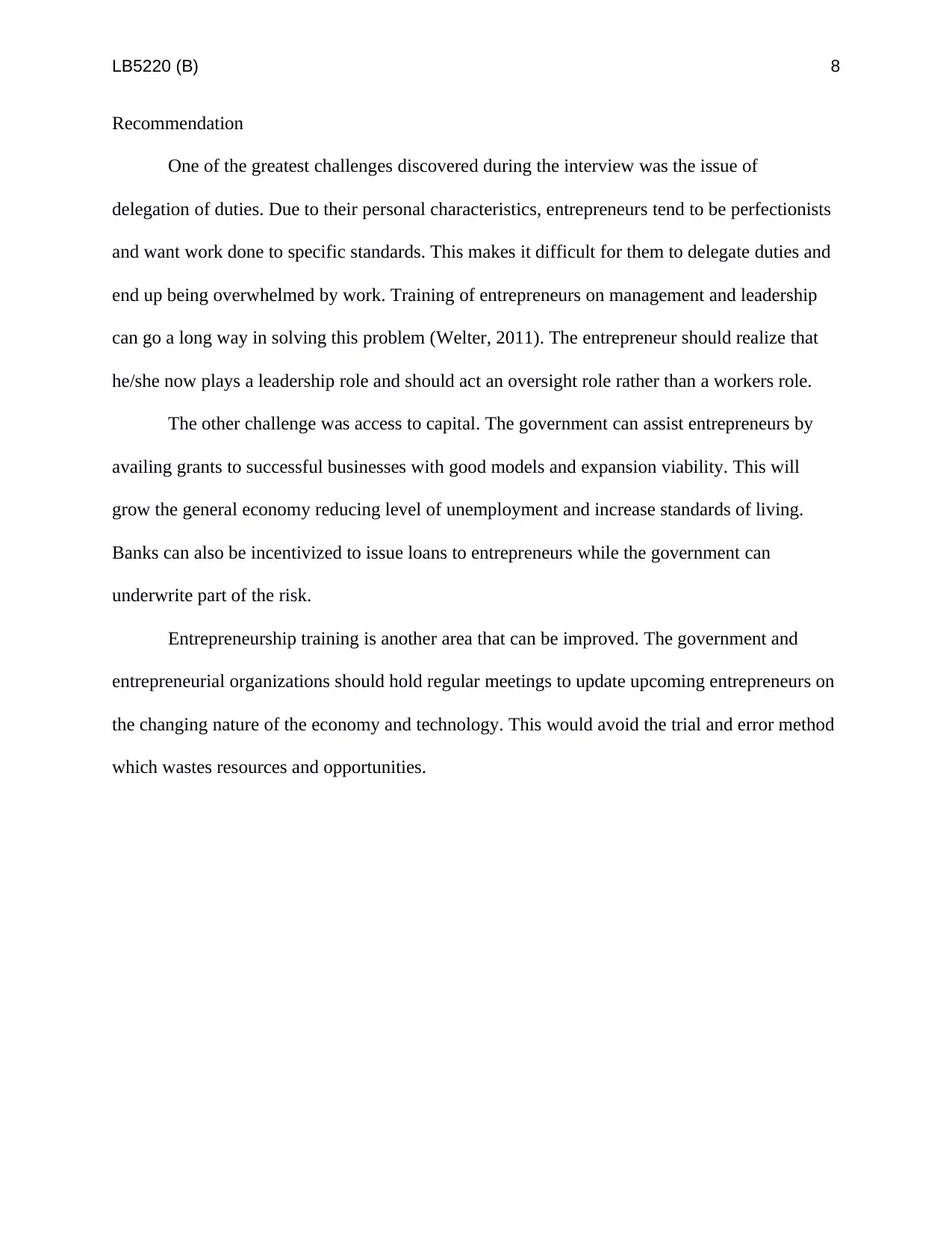
LB5220 (B) 8
Recommendation
One of the greatest challenges discovered during the interview was the issue of
delegation of duties. Due to their personal characteristics, entrepreneurs tend to be perfectionists
and want work done to specific standards. This makes it difficult for them to delegate duties and
end up being overwhelmed by work. Training of entrepreneurs on management and leadership
can go a long way in solving this problem (Welter, 2011). The entrepreneur should realize that
he/she now plays a leadership role and should act an oversight role rather than a workers role.
The other challenge was access to capital. The government can assist entrepreneurs by
availing grants to successful businesses with good models and expansion viability. This will
grow the general economy reducing level of unemployment and increase standards of living.
Banks can also be incentivized to issue loans to entrepreneurs while the government can
underwrite part of the risk.
Entrepreneurship training is another area that can be improved. The government and
entrepreneurial organizations should hold regular meetings to update upcoming entrepreneurs on
the changing nature of the economy and technology. This would avoid the trial and error method
which wastes resources and opportunities.
Recommendation
One of the greatest challenges discovered during the interview was the issue of
delegation of duties. Due to their personal characteristics, entrepreneurs tend to be perfectionists
and want work done to specific standards. This makes it difficult for them to delegate duties and
end up being overwhelmed by work. Training of entrepreneurs on management and leadership
can go a long way in solving this problem (Welter, 2011). The entrepreneur should realize that
he/she now plays a leadership role and should act an oversight role rather than a workers role.
The other challenge was access to capital. The government can assist entrepreneurs by
availing grants to successful businesses with good models and expansion viability. This will
grow the general economy reducing level of unemployment and increase standards of living.
Banks can also be incentivized to issue loans to entrepreneurs while the government can
underwrite part of the risk.
Entrepreneurship training is another area that can be improved. The government and
entrepreneurial organizations should hold regular meetings to update upcoming entrepreneurs on
the changing nature of the economy and technology. This would avoid the trial and error method
which wastes resources and opportunities.
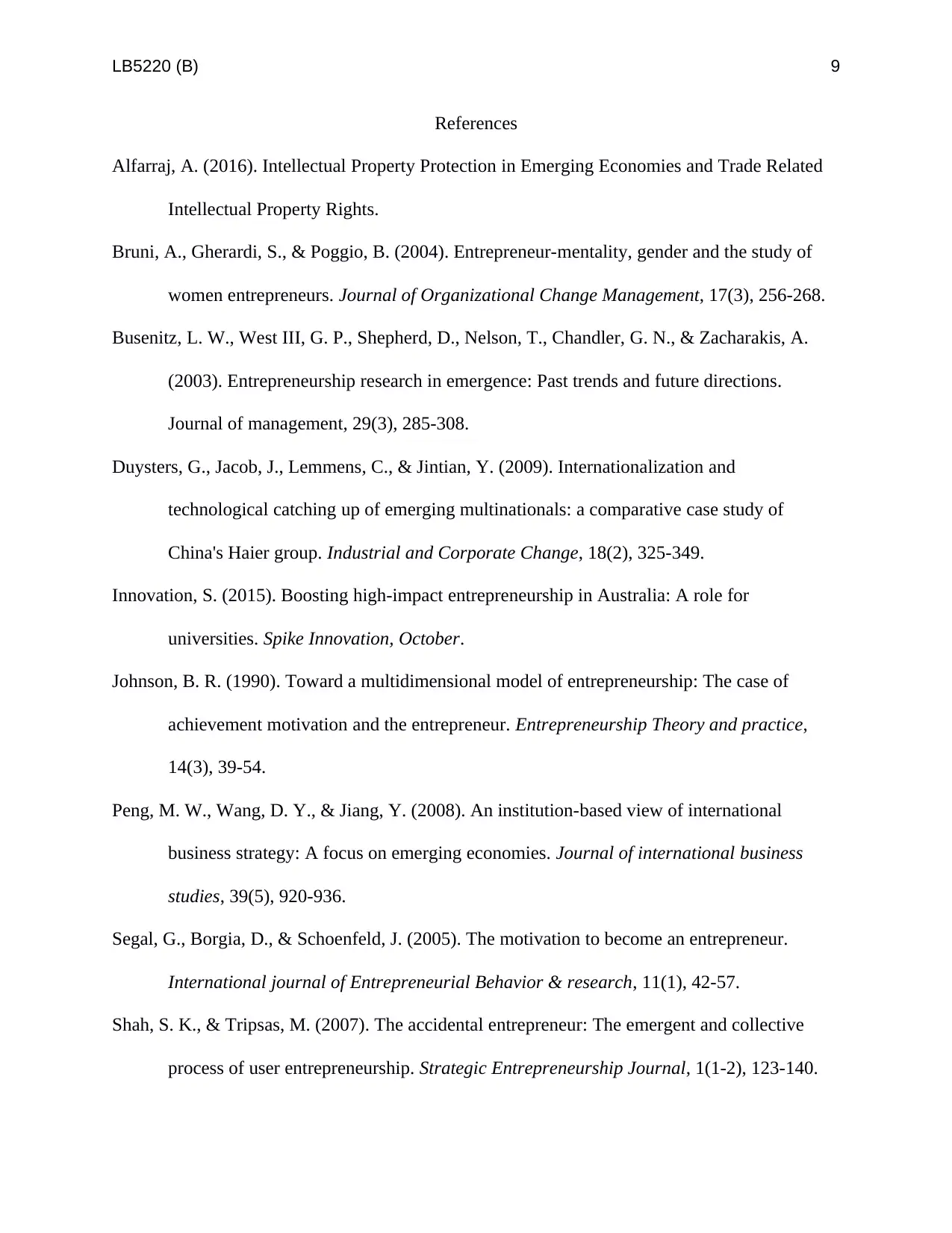
LB5220 (B) 9
References
Alfarraj, A. (2016). Intellectual Property Protection in Emerging Economies and Trade Related
Intellectual Property Rights.
Bruni, A., Gherardi, S., & Poggio, B. (2004). Entrepreneur-mentality, gender and the study of
women entrepreneurs. Journal of Organizational Change Management, 17(3), 256-268.
Busenitz, L. W., West III, G. P., Shepherd, D., Nelson, T., Chandler, G. N., & Zacharakis, A.
(2003). Entrepreneurship research in emergence: Past trends and future directions.
Journal of management, 29(3), 285-308.
Duysters, G., Jacob, J., Lemmens, C., & Jintian, Y. (2009). Internationalization and
technological catching up of emerging multinationals: a comparative case study of
China's Haier group. Industrial and Corporate Change, 18(2), 325-349.
Innovation, S. (2015). Boosting high-impact entrepreneurship in Australia: A role for
universities. Spike Innovation, October.
Johnson, B. R. (1990). Toward a multidimensional model of entrepreneurship: The case of
achievement motivation and the entrepreneur. Entrepreneurship Theory and practice,
14(3), 39-54.
Peng, M. W., Wang, D. Y., & Jiang, Y. (2008). An institution-based view of international
business strategy: A focus on emerging economies. Journal of international business
studies, 39(5), 920-936.
Segal, G., Borgia, D., & Schoenfeld, J. (2005). The motivation to become an entrepreneur.
International journal of Entrepreneurial Behavior & research, 11(1), 42-57.
Shah, S. K., & Tripsas, M. (2007). The accidental entrepreneur: The emergent and collective
process of user entrepreneurship. Strategic Entrepreneurship Journal, 1(1‐2), 123-140.
References
Alfarraj, A. (2016). Intellectual Property Protection in Emerging Economies and Trade Related
Intellectual Property Rights.
Bruni, A., Gherardi, S., & Poggio, B. (2004). Entrepreneur-mentality, gender and the study of
women entrepreneurs. Journal of Organizational Change Management, 17(3), 256-268.
Busenitz, L. W., West III, G. P., Shepherd, D., Nelson, T., Chandler, G. N., & Zacharakis, A.
(2003). Entrepreneurship research in emergence: Past trends and future directions.
Journal of management, 29(3), 285-308.
Duysters, G., Jacob, J., Lemmens, C., & Jintian, Y. (2009). Internationalization and
technological catching up of emerging multinationals: a comparative case study of
China's Haier group. Industrial and Corporate Change, 18(2), 325-349.
Innovation, S. (2015). Boosting high-impact entrepreneurship in Australia: A role for
universities. Spike Innovation, October.
Johnson, B. R. (1990). Toward a multidimensional model of entrepreneurship: The case of
achievement motivation and the entrepreneur. Entrepreneurship Theory and practice,
14(3), 39-54.
Peng, M. W., Wang, D. Y., & Jiang, Y. (2008). An institution-based view of international
business strategy: A focus on emerging economies. Journal of international business
studies, 39(5), 920-936.
Segal, G., Borgia, D., & Schoenfeld, J. (2005). The motivation to become an entrepreneur.
International journal of Entrepreneurial Behavior & research, 11(1), 42-57.
Shah, S. K., & Tripsas, M. (2007). The accidental entrepreneur: The emergent and collective
process of user entrepreneurship. Strategic Entrepreneurship Journal, 1(1‐2), 123-140.

LB5220 (B) 10
Welter, F. (2011). Contextualizing entrepreneurship—conceptual challenges and ways forward.
Entrepreneurship theory and Practice, 35(1), 165-184.
Welter, F. (2011). Contextualizing entrepreneurship—conceptual challenges and ways forward.
Entrepreneurship theory and Practice, 35(1), 165-184.
Paraphrase This Document
Need a fresh take? Get an instant paraphrase of this document with our AI Paraphraser
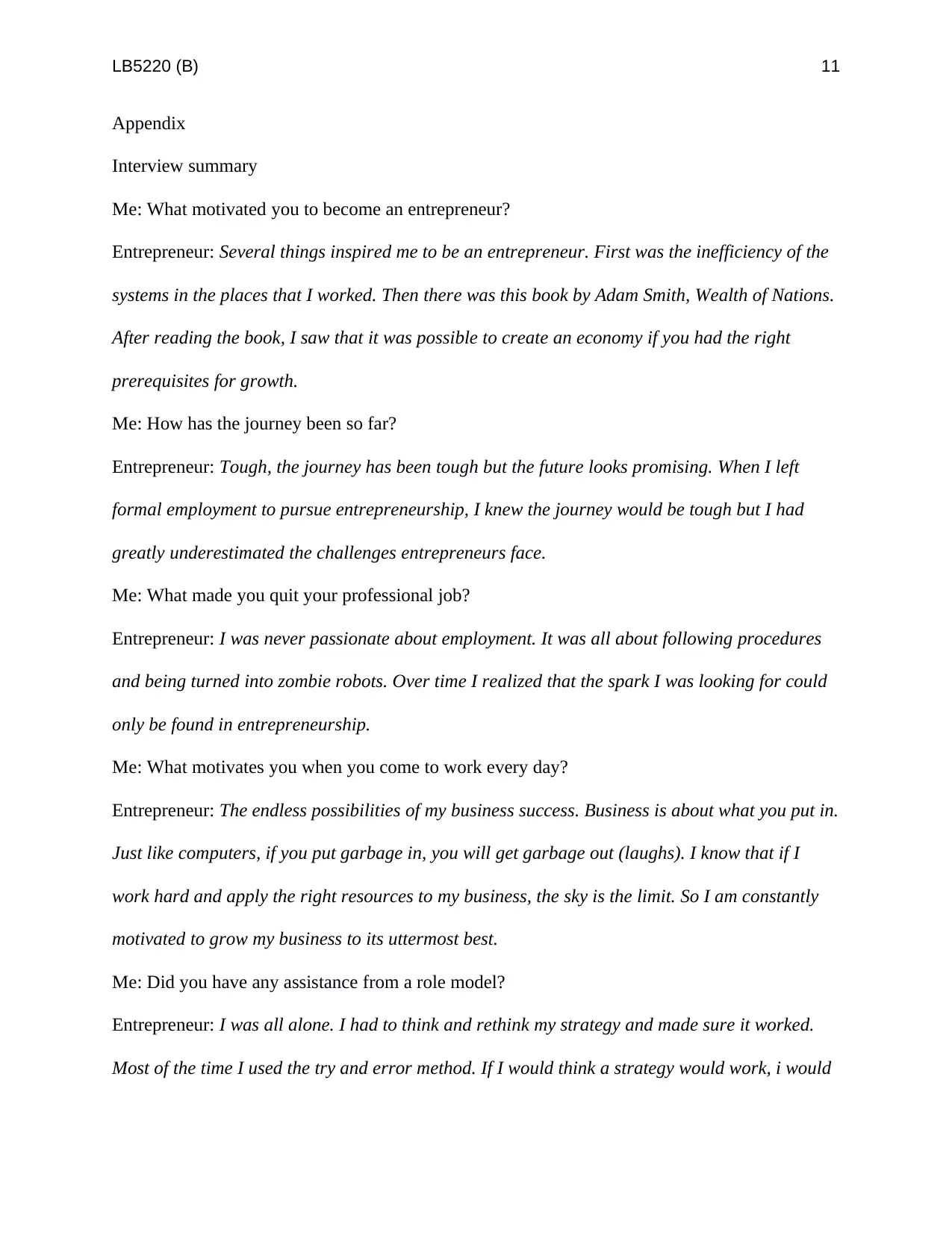
LB5220 (B) 11
Appendix
Interview summary
Me: What motivated you to become an entrepreneur?
Entrepreneur: Several things inspired me to be an entrepreneur. First was the inefficiency of the
systems in the places that I worked. Then there was this book by Adam Smith, Wealth of Nations.
After reading the book, I saw that it was possible to create an economy if you had the right
prerequisites for growth.
Me: How has the journey been so far?
Entrepreneur: Tough, the journey has been tough but the future looks promising. When I left
formal employment to pursue entrepreneurship, I knew the journey would be tough but I had
greatly underestimated the challenges entrepreneurs face.
Me: What made you quit your professional job?
Entrepreneur: I was never passionate about employment. It was all about following procedures
and being turned into zombie robots. Over time I realized that the spark I was looking for could
only be found in entrepreneurship.
Me: What motivates you when you come to work every day?
Entrepreneur: The endless possibilities of my business success. Business is about what you put in.
Just like computers, if you put garbage in, you will get garbage out (laughs). I know that if I
work hard and apply the right resources to my business, the sky is the limit. So I am constantly
motivated to grow my business to its uttermost best.
Me: Did you have any assistance from a role model?
Entrepreneur: I was all alone. I had to think and rethink my strategy and made sure it worked.
Most of the time I used the try and error method. If I would think a strategy would work, i would
Appendix
Interview summary
Me: What motivated you to become an entrepreneur?
Entrepreneur: Several things inspired me to be an entrepreneur. First was the inefficiency of the
systems in the places that I worked. Then there was this book by Adam Smith, Wealth of Nations.
After reading the book, I saw that it was possible to create an economy if you had the right
prerequisites for growth.
Me: How has the journey been so far?
Entrepreneur: Tough, the journey has been tough but the future looks promising. When I left
formal employment to pursue entrepreneurship, I knew the journey would be tough but I had
greatly underestimated the challenges entrepreneurs face.
Me: What made you quit your professional job?
Entrepreneur: I was never passionate about employment. It was all about following procedures
and being turned into zombie robots. Over time I realized that the spark I was looking for could
only be found in entrepreneurship.
Me: What motivates you when you come to work every day?
Entrepreneur: The endless possibilities of my business success. Business is about what you put in.
Just like computers, if you put garbage in, you will get garbage out (laughs). I know that if I
work hard and apply the right resources to my business, the sky is the limit. So I am constantly
motivated to grow my business to its uttermost best.
Me: Did you have any assistance from a role model?
Entrepreneur: I was all alone. I had to think and rethink my strategy and made sure it worked.
Most of the time I used the try and error method. If I would think a strategy would work, i would
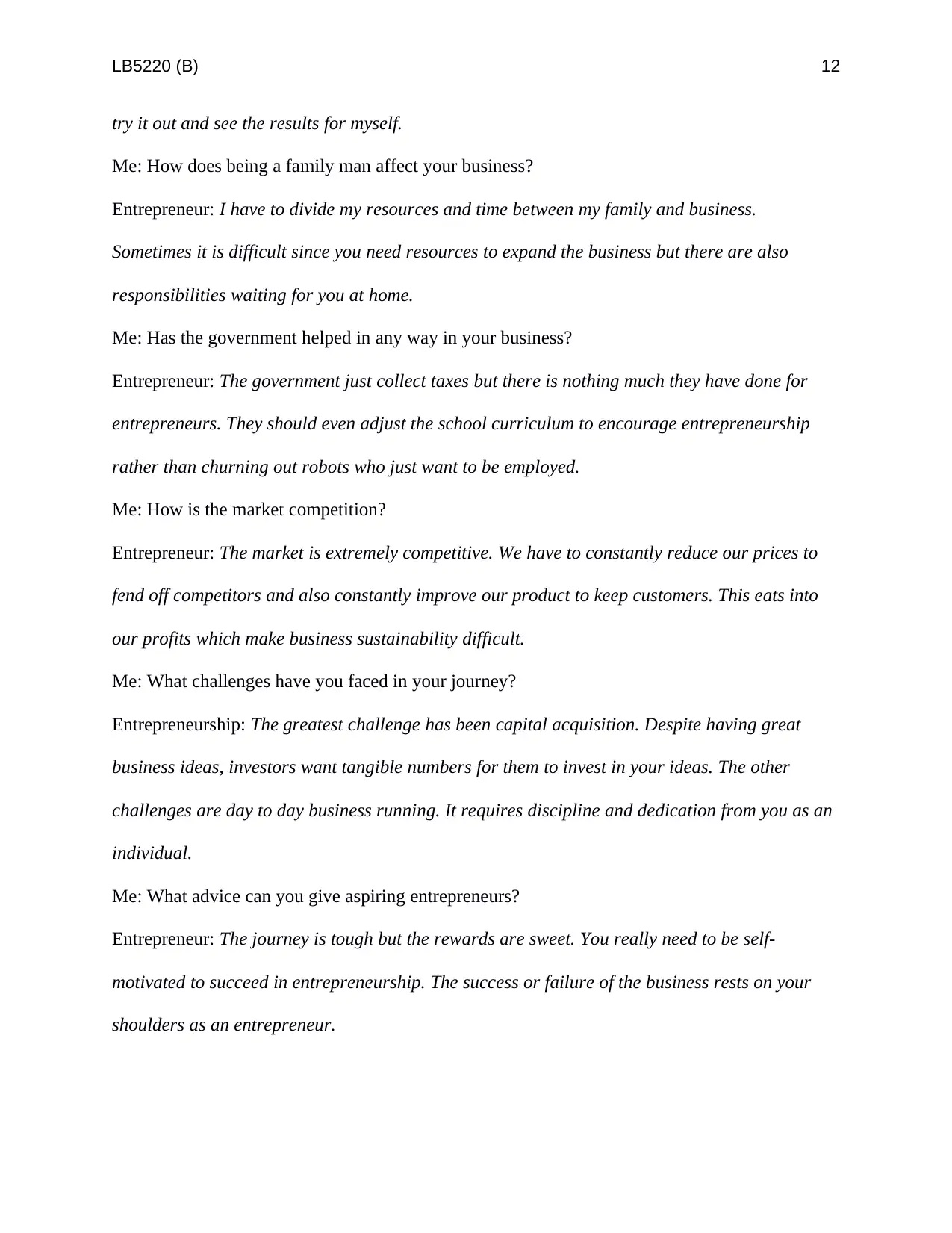
LB5220 (B) 12
try it out and see the results for myself.
Me: How does being a family man affect your business?
Entrepreneur: I have to divide my resources and time between my family and business.
Sometimes it is difficult since you need resources to expand the business but there are also
responsibilities waiting for you at home.
Me: Has the government helped in any way in your business?
Entrepreneur: The government just collect taxes but there is nothing much they have done for
entrepreneurs. They should even adjust the school curriculum to encourage entrepreneurship
rather than churning out robots who just want to be employed.
Me: How is the market competition?
Entrepreneur: The market is extremely competitive. We have to constantly reduce our prices to
fend off competitors and also constantly improve our product to keep customers. This eats into
our profits which make business sustainability difficult.
Me: What challenges have you faced in your journey?
Entrepreneurship: The greatest challenge has been capital acquisition. Despite having great
business ideas, investors want tangible numbers for them to invest in your ideas. The other
challenges are day to day business running. It requires discipline and dedication from you as an
individual.
Me: What advice can you give aspiring entrepreneurs?
Entrepreneur: The journey is tough but the rewards are sweet. You really need to be self-
motivated to succeed in entrepreneurship. The success or failure of the business rests on your
shoulders as an entrepreneur.
try it out and see the results for myself.
Me: How does being a family man affect your business?
Entrepreneur: I have to divide my resources and time between my family and business.
Sometimes it is difficult since you need resources to expand the business but there are also
responsibilities waiting for you at home.
Me: Has the government helped in any way in your business?
Entrepreneur: The government just collect taxes but there is nothing much they have done for
entrepreneurs. They should even adjust the school curriculum to encourage entrepreneurship
rather than churning out robots who just want to be employed.
Me: How is the market competition?
Entrepreneur: The market is extremely competitive. We have to constantly reduce our prices to
fend off competitors and also constantly improve our product to keep customers. This eats into
our profits which make business sustainability difficult.
Me: What challenges have you faced in your journey?
Entrepreneurship: The greatest challenge has been capital acquisition. Despite having great
business ideas, investors want tangible numbers for them to invest in your ideas. The other
challenges are day to day business running. It requires discipline and dedication from you as an
individual.
Me: What advice can you give aspiring entrepreneurs?
Entrepreneur: The journey is tough but the rewards are sweet. You really need to be self-
motivated to succeed in entrepreneurship. The success or failure of the business rests on your
shoulders as an entrepreneur.
1 out of 12
![[object Object]](/_next/static/media/star-bottom.7253800d.svg)




